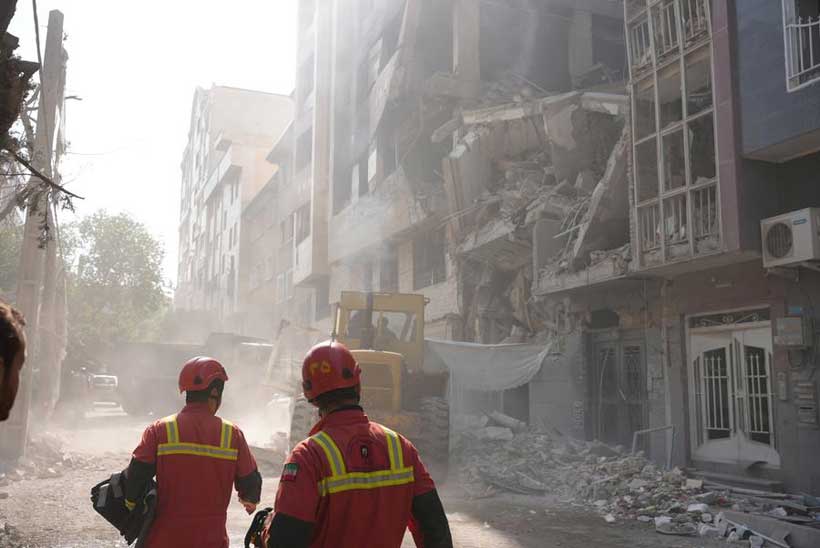In a realist world, power is rarely exercised alone. It takes coordination, sustained support, and mutual loyalty to project strength. That is the foundation of any enduring alliance. Since the Cold War, Western powers have built a sophisticated web of strategic alliances, sometimes tested but still intact. Even amid nationalist disruptions under figures like Donald Trump or Viktor Orbán, the Western alliance remains functional and coherent. But what about the non-Western bloc, Russia, China, Iran, North Korea, Cuba, and others?
The truth is that non-Western alliances remain weak, fragmented, and often symbolic. Lacking geographic proximity, institutional architecture, or political cohesion, these alliances fail to act in unison, especially in moments of crisis. Military cooperation, defense technology sharing, and strategic communication remain alarmingly underdeveloped.
The recent Israeli attack on Iran exposed this blatantly. Reportedly Isreal forces used the Jordanian and Iraqi airspace, struck Iranian nuclear and military facilities, killing multiple top officials. While rumors circulated about an imminent war, Iran’s response was surprisingly feeble. It’s defense systems failed to intercept the attacks, and its military preparedness appeared outdated from the start. But recent retaliation followed a little bit of promise.
The United States denied direct involvement. Yet Washington, alongside the European allies, refrained from condemning the strike. Germany, France, and the United Kingdom stood silent, indirectly backing Israel through intelligence sharing, military cooperation, and diplomatic support. Their strategic coordination remains strong, despite tensions over Iran’s nuclear program.
What about Iran’s Non-Western allies?
Russia, arguably Iran’s closest partner, is deeply engaged in its own war in Ukraine. Yet strategic alliances are tested precisely in such moments. Iran and Russia have long shared regional interests in Syria and other part of the Middle East. Now, that cooperation seems one-sided. While Russia uses Iranian drones in Ukraine, Tehran receives little in return. No warning, no defense coordination, and certainly no technological assistance ahead of Israel’s strike.
Why hasn’t Russia helped accelerate Iran’s nuclear program as Western powers once did for Israel? Where was the intelligence sharing, the strategic dialogue? These absences raise serious questions about Russia’s role in the non-Western alliance framework: Is it simply a transactional partner or something more?
China is a different story. With an advanced defense industry and growing geopolitical clout, Beijing has demonstrated capability. The recent deployment of Chinese J-10C jets to Pakistan, for example, during tensions with India, signaled a serious technological and symbolic counterweight to Western influence. China even provided real-time intelligence to Pakistan. But where was this level of support for Iran? Through recent rumor said, there are couple of military assistance provided to Iran but still not like ally.
A newly inaugurated Iran-China railroad project suggests growing economic ties, but modern alliances require more than trade. Strategic defense coordination is fundamental. Despite Iran’s geopolitical relevance, Beijing remains largely absent in Iran’s security calculus.
Then there is Iran’s own regional network, its so-called “axis of resistance.” Historically, Iran projected strength through proxies like Hezbollah, Hamas, and the Houthis. But this too is unraveling. Hezbollah leader Hassan Nasrallah and Hamas political chief Ismail Haniyeh were both reportedly killed by Israeli operations, Haniyeh during an official visit in Tehran itself. These assassinations not only reflect Tehran’s inability to protect its partners but also signal a crisis of credibility. No meaningful retaliation followed. This absence of action weakens Iran’s reputation as a guarantor of its proxies’ survival.
The broader picture is troubling. Non-Western powers often operate like solo actors in a system that punishes isolation. The world is a dark forest; walk alone, and sooner or later, the wolves will find you. This is the lesson non-Western allies must internalize. Shared struggle requires shared commitment. Each country will always have its own domestic priorities, but alliances demand sacrifice, coordination, and strategic depth.
It seems like their trust-building process is yet to work. Or are they afraid to confront Western allies’ wrath over sanctions? China and Russia have been conducting business and various forms of economic cooperation with most of the Western blocs, despite sanctions threats and targeted regulations. These two nations need to step up and anchor the non-Western bloc. A multipolar world needs a table where bipolar allies can collaborate and pave the path for a democratic alliance for the world. Trump’s approach to Europe and other Western countries is not seen as a sign of alliance. So at this moment, non-Western countries can show unity. This not only gives the world new hope for cooperative living ideas but also threatens Trump’s leadership position on global order.
China has the defense capacity to empower allies but remains hesitant. Russia, once a superpower, is now locked in a war that undermines its influence and exposes its limits. In today’s geopolitical landscape, superpowers act more like coaches than players. Mediation, defense sharing, and regional stabilization efforts, rather than confrontation, are what build strategic resilience.
For the non-Western bloc, the Israel-Iran crisis must serve as a wake-up call. Without solidarity, without trust, and without strategy, they risk becoming a coalition of convenience. This also reflects unity in rhetoric but division and defeat in reality.
